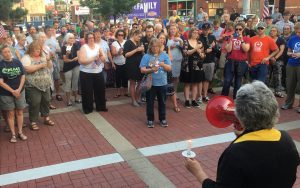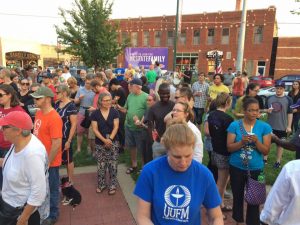
Why do we have to denounce something as clearly horrible as Nazism and white supremacy? It ought to be clear. Every person of conscience knows that the ideas they endorse are anathema.
As many of you know, Manhattan Alliance for Peace and Justice sponsored a rally in response to the events in Charlottesville, Virginia, this past weekend. Around 200 people, including lots of UU’s (see the T-shirts?!) gathered in Triangle Park to counter messages of racism and bigotry. Similar rallies took place across the nation. We refuse to cede our country to white supremacists, neo-Nazis, and others whose shrill voices incite hate and fear and whose guns and torches strive to intimidate anyone different from themselves.
Those shrill voices have been beckoned from their hiding places in the dark web by people in power who want to use their racist agenda to promote policies like mass deportations of Central and South Americans (I have seen no clamor for deporting undocumented people from Canada and Ireland, or even the far east), “law and order” directed at communities of color, and reinstatement of white men in the places of power. We need to be honest about the ways that white supremacy is woven into the fabric of this nation, and that many forces — not only neo-Nazis and the alt-right — want to resist the fight to end the hold white supremacy has had on the nation.
The rallying around the statue of Thomas Jefferson illustrates the point. Revered as a “founding father,” his words of equality did not apply to women or African Americans. Like many of our founders, he owned slaves. Our nation, like Jefferson himself, like all of us, has long been torn between its ideals and the desire to dominate and profit from others.
The violent white supremacists of the KKK and their ilk are drawing on a limited part of our American history as justification for their ugly acts. Limited, yes, but a real part of history. A part many of us strive to deny. Faced with people who would affirm that part of history with violence, we have to acknowledge its reality and at the same time, work for the changes that will relegate inequality and injustice to the trash bins of history.
We join hands with others across divisions of race and religion, and even across time to do so. I find some solace in the words of The Rev. Theodore Parker, nineteenth century white abolitionist and Unitarian minister: “I do not pretend to understand the moral universe; the arc is a long one, my eye reaches but little ways; I cannot calculate the curve and complete the figure by the experience of sight; I can divine it by conscience. And from what I see I am sure it bends towards justice.”
So may it be.
In faith and freedom,
Jonalu
